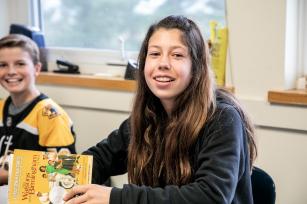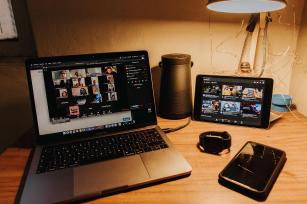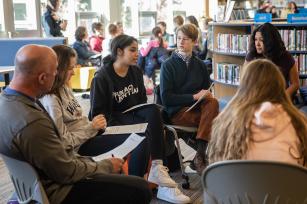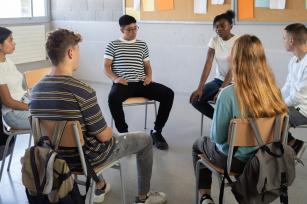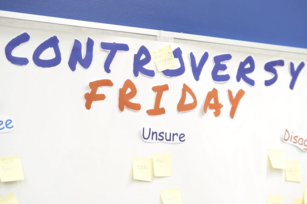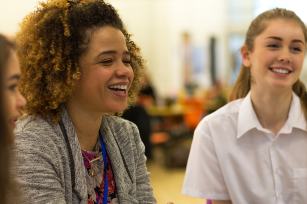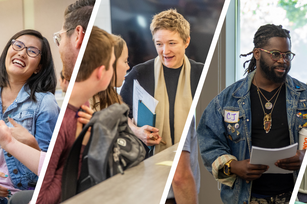
Breadcrumb
- Essential Partners
- Our Impact
- Impact Stories
- Building an Inclusive Community with Cary Academy (NC)
Building an Inclusive Community with Cary Academy (NC)
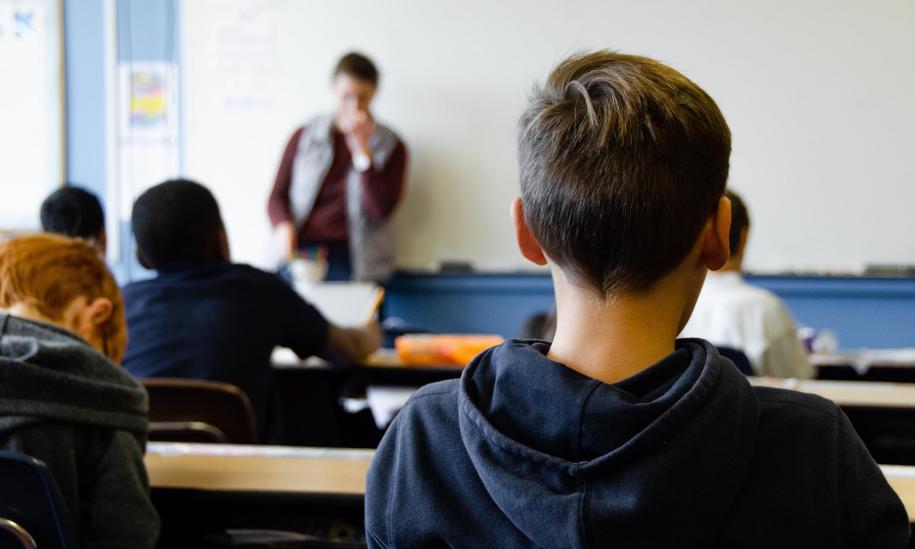
This impact story was originally published at the Cary Academy website and is reproduced here with permission.
What is the key to understanding each other? What allows us to open ourselves to the diverse experience and perspectives of others? How can we create a community strengthened by our differences, rather than one divided by them? How can we engage in difficult conversations around important—and even polarizing—issues in ways that support, respect, and validate all our community members, their belief systems, and backgrounds?
As a learning community that places a high value on inclusivity and equity, these questions are of the utmost importance at Cary Academy. Now in its third year, the Dialogue Across Difference initiative aims to respond to them by providing a framework for community members to “meet in the middle” to respectfully and thoughtfully engage each other’s differences in a productive, validating, and community-building way.
“We are one of the most diverse independent schools in the Southeast. It doesn’t matter that we are all at Cary Academy, each one of us brings different things—perspectives, experiences, backgrounds—to the table,” offers Director of Equity and Community Engagement Danielle Johnson-Webb.
“It’s critical that all of our students, faculty, and staff, feel that their voices are heard loud and clear, so, at the end of the day, we can find common ground,” continues Johnson-Webb. “So that we can say ‘We may come from different backgrounds, have different perspectives, or different opinions, but we still care about the same things. We still share concerns. We still value and respect each other as community members despite our differences and can learn from each other because of them.’”
Dialogue across Difference launched at CA in 2017, after CA’s leadership identified a need to help facilitate challenging conversations on campus. After an exhaustive search, they ultimately chose the Reflective Structured Dialogue method employed by Cambridge, Massachusetts-based consulting firm, Essential Partners, having encountered the approach in use at the University of North Carolina.
Reflective Structured Dialogue relies on personal narratives to break down stereotypes and create a sense of common ground and shared humanity. Participants are encouraged to listen and reflect upon what they hear, rather than react. All of this happens within a guided, structured format that ensures everyone has the chance to speak and to be heard in an open, thoughtful environment.
The Power of Dialogue
“Vulnerability is the key,” explains Meirav Solomon ’21, who underwent intensive training to become a dialogue facilitator as part of an expansion of the Dialogue Across Difference initiative. “A lot of perspective-taking is based in vulnerability. It’s the key ingredient in a good structured dialogue. It’s crucial to the ‘meet me in the middle’ experience that dialogue is all about.”
And “meeting in the middle” is crucial. Johnson-Webb is quick to point out that the goal of dialogue is not about changing anyone’s mind. “It isn’t debate; it isn’t intended to be persuasive,” explains Johnson-Webb. “Dialogue doesn’t mean that you have to accept what someone else says as your truth; its intent is only to build a common understanding.”
That’s a distinction that isn’t lost on students. “When a debate occurs, you never feel like you get to hear a person’s full point of view,” explains Vibhav Nandagiri ’21, a newly-trained dialogue facilitator. “But, through dialogue, you get to learn someone else’s perspective without any competitive need to win an argument. It leads to mutual understanding; listening to each other helps us chip away at our differences.”
It is a process that Clay Thornton ’21 has found leads to a closer connection and the development of empathy. “It’s hard to argue with someone’s experience,” he explains. “Having an environment that gives you that space to listen to others talk about their experiences and understand how those experiences have led them to the opinions that they have—it is truly eye-opening.”
Importantly, dialogue isn’t just about listening; the act of storytelling is just as important to the process. “To form the connections and relationships, it’s all about storytelling in the beginning,” explains teacher and Upper School advisor Kimberly Shaw, an inaugural Essential Partners Fellow, who took part in intensive leadership training in Boston and has led dialogues on college campuses and amongst communities beyond the CA campus.
“As you enter a dialogue, you can either decide to lean into your vulnerability and share your story, or you can hang back; the more vulnerable you allow yourself to become, the more connected you feel with those around you,” Shaw explains. “My first dialogue was in a group of strangers from around the globe. After two days of sharing our stories, sharing pieces of ourselves, and listening to each other speak our truths—I’ve never felt such strong connections to people that I’ve only known for two days. That’s the power of dialogue.”
To create that safe space that allows participants to “lean into their vulnerability,” dialogue has strict guidelines, rules of engagement that are co-authored and agreed to by all participants at the outset. These guidelines might cover anything from respectful body language, to allowing space for silence, to prohibiting cross-talk and interruptions, to confidentiality and assurances that what is said in the dialogue space, stays in the dialogue space, or any other parameters that the participants feel need to be addressed.
For Becca Humphries ’21, the creation of that safe space made all the difference in her dialogue training experience. “The dialogue setting created an environment where people weren’t afraid to open up and share those things that they might not always share out loud. It made us feel closer and provided a stronger sense of trust. It allowed me to be vulnerable to people outside of my community and to be open to sharing.”
Dialogue on Campus
Dialogue Across Difference is considered so critical to CA’s core value of fostering a richly diverse, equitable, and inclusive learning community that it is a core commitment of the Center for Community Engagement. The newly formed Center, which coordinates cross-divisional work in experiential learning, service learning, entrepreneurship, and equity, offers students opportunities to stretch, grow, and co-author their learning through meaningful engagements both within and outside of the CA community.
During the first two years of Dialogue Across Difference, the program initiated dialogues amongst CA’s faculty and staff, Board of Directors, parent groups, and students. The first student dialogues were facilitated by faculty members, with later dialogues co-facilitated with student leaders who had participated in specialized training.
The success of those latter dialogues inspired Johnson-Webb, who envisions student leadership as an important strategy for building community both on campus and off. It is this vision that prompted the recent training of 17 new student facilitators in October; 17 more students will undergo training in the spring.
Indeed, the shift from dialogue participant to facilitator was a powerful leadership experience for recent student trainee Jordan Cuffee ’21: “The dialogue training allowed me to push myself to speak up first. In an informal conversation, I’m not usually the first person to voice my opinion; I usually end up listening, rather than taking a stance on sharing my opinion. But the dialogue training empowered us to decide if we want to say something now or listen. It really made me feel part of the conversation, rather than being on the outside, observing.”
“Like all CA programming, we’re always evaluating and reflecting to consider what is working and what isn’t, how we can increase impact, how to better meet the needs of our community,” says Johnson-Webb. “Putting students in the drivers’ seats as trained facilitators in these dialogue sessions, allowing them to own the process and work alongside faculty to address community issues—it makes them more invested in the dialogues. Hopefully, that leads to meaningful experiences that benefit our whole community.”
“Student facilitators flip the script,” offers Shaw. “When students lead, you can see a change occur, a shift as they understand the difference between being a participant and being a facilitator, as they work to hear and address the needs of their classmates and community.”
That shift is already having an impact on the way students see their concerns being heard by faculty and staff. “It makes you respect [the faculty] even more when they talk to you as equals,” Nandagiri explains. “To harness that in dialogue allowed me to realize that they actually do want to meet us in the middle.”
“Even though I knew my opinion was valid, to know that everyone there—not only the students but the teachers too—wanted to hear what I had to say, it made me feel my experience mattered,” adds Cuffee.
In addition to increasing student facilitator training, Johnson-Webb is also altering the way dialogues are implemented school-wide by engaging Upper School students in the choice of topics they will take up during this year’s dialogues.
Already, a committee of student leaders has suggested a slate of dialogue topics that will be put to a vote by the Upper School student body. Topics under consideration include the role of PE and athletics on student health at CA; the definition of privilege, how it is manifested at CA, and its impact on students’ futures; how to better foster a community that honors all political ideologies; social dynamics and cliques; and stress and academic pressure.
It’s an innovative and forward-thinking approach to fostering inclusivity that sets CA apart. “The best thing a school can do is to call us before there’s a crisis—to live out the fullness of its diversity, to strengthen community resilience, or to transform its institutional culture,” offers Essential Partners Co-Director John Sarrouf. “Cary Academy’s vision and ambition are groundbreaking, and they are inspiring other schools to develop robust cultures of dialogue as well.”
Related Impact Stories
Testimonials

High School StudentI learned that through productive dialogue, you can make relationships and friendships with people through talking about your differences and similarities.
Newburyport, MA

Allyson Bachta, K-12 Educator and AdministratorEP's approach is flexible enough to support educators working across diverse contexts and parallels work that they are already doing to support students' social-emotional development, create trauma-sensitive classrooms and schools, and differentiate learning experiences to meet the needs of all learners.
Massachusetts

Andrew Wulf, PrincipalThe community dialogue was instrumental in helping us create a new policy around class rank. Though a controversial topic in the community, the dialogue EP helped us run ensured all voices were heard and valued. Regardless of how people felt with the final result, one parent summed it up best for us, ‘sometimes the process is more important than the outcome’.
Newburyport High School

Meirav Solomon ’21Vulnerability is the key. A lot of perspective-taking is based in vulnerability. It’s the key ingredient in a good structured dialogue. It’s crucial to the ‘meet me in the middle’ experience that dialogue is all about.
Cary Academy, NC

High School StudentSimply changing the wording of a question can invite a completely different personality and emotion around a question. You can learn so much more and have a better understanding of someone's perspective by changing your question.
Raleigh, NC

Belle AbayaTogether, we married our ideas to create a dialogue model that took into consideration our young people’s particular needs, and our culture.
The Conflict Resolution Group Foundation, Philippines

Bob Bordone, Expert and AuthorEssential Partners does the best work in the field of dialogue and communication.
Harvard Negotiation & Mediation Clinical Program, Co-Founder

Cat Anderson, EducatorIt's incredible to really see the evolution and the change of these students, once they're given the tools—and Essential Partners has really helped me do that.
Boulevard Academy, Oklahoma

Nicki Glasser, Policy CoordinatorWhat surprised me was how much you could transform a relationship during a three-hour conversation.
Transformation Center, Massachusetts

High School StudentThe thing that surprised me, was the amount of respect given to each person while speaking in the meeting. I thought that discussing politics would eventually cause problems, but it did not.
Raleigh, NC

Program ParticipantThis is the best adult learning experience I have had in the past five years. I wanted to learn new skills—I did!

Parent, Cary AcademyEssential Partners's dialogue initiative is, literally, the best forum I have attended during my time at Cary Academy. The openness and sharing in our group led to genuine connections. I’m not sure words can express how meaningful this event was to me. Truly priceless.
Cary, North Carolina

Linda Gryczan, MediatorInstead of demonizing and dehumanizing the other, we built a deeper connection. The fact that we disagree matters much less. It matters much more that we are neighbors in this community.
Montana Mediation Association

Becca Humphries ’21The dialogue setting created an environment where people weren’t afraid to open up and share those things that they might not always share out loud. It made us feel closer and provided a stronger sense of trust. It allowed me to be vulnerable to people outside of my community and to be open to sharing.
Cary Academy, NC

High School StudentIt honestly surprised me that we were doing [dialogues about the 2020 election] in the first place. I have gone to this school since Kindergarten, and I have seen the recurring pattern of the faculty and staff looking to keep politics out of school discussion, which is completely understandable. Growing up this way has built a sort of stigma around politics that I feel like affected my experience in these activities. This also prompted me to learn more about how I feel about these topics.
North Carolina

Program ParticipantI did not anticipate having as many concrete takeaways as I do. I feel there is an immense practical application.

Secondary School TeacherEP's approach has given me some tools to deal with what comes up in my classroom. I teach classes about charged topics. As I’m thinking about and exploring ways to broach these conversations with students, I use this.
New Jersey

Kimberly Shaw, EducatorStudent facilitators flip the script. When students lead, you can see a change occur, a shift as they understand the difference between being a participant and being a facilitator, as they work to hear and address the needs of their classmates and community.
North Carolina

Teresa Grettano, Associate Professor and Director of the First-Year Writing programFacilitated dialogue creates a classroom atmosphere in which exploring uncomfortable issues and asking difficult questions is an expected part of the process, and it allows students space to engage each other without fear of the vitriol common in our public discourse.
University of Scranton (PA)

10th Grade StudentEP's questions of understanding exercise felt like the debate that we wish the presidential candidates would have—instead of having to listen to two old guys yelling over each other.
Ravenscroft School, NC

Program ParticipantI felt an amazing sense of accomplishment when the Essential Partners training ended; that I'd done something important for my community and something important for me.
Massachusetts

Becca Humphries ’21The dialogue setting created an environment where people weren’t afraid to open up and share those things that they might not always share out loud. It made us feel closer and provided a stronger sense of trust. It allowed me to be vulnerable to people outside of my community and to be open to sharing.
Cary Academy, NC

Megan DeFranzaHere safe space was created for pastors and church leaders to wrestle with topics like evolution which are all too often “off limits” or believed to be antagonistic to the faith.
Gordon College, Massachusetts

Vibhav Nandagiri ’21When a debate occurs, you never feel like you get to hear a person’s full point of view. But, through dialogue, you get to learn someone else’s perspective without any competitive need to win an argument. It leads to mutual understanding; listening to each other helps us chip away at our differences.
Cary Academy, NC

Sophia Hopper ’24Dialogue changed how I think about the way my school runs.… now I know the people running this institution. I know their values. I know their story. There's a whole new level of trust in the institution itself.
Ravenscroft School, North Carolina

Kim Davidson, OmbudsI’ve gained not only confidence but tools. The Essential Partners training was worth every penny.
Oberlin College, Ohio

High School StudentThe most significant thing I've learned in this program is that having an open mindset when listening to others' opinions different from yours to understand their perspective instead of finding the flaws to oppose their opinion to try and change their mind.
Raleigh, NC

Misty Stoll, School Board TrusteeI ran for my local school board in 2018 and was elected. I use the skills in our meetings, whether I’m chairing the meeting or not. This makes the meetings much more productive. We don’t go over the same topics over and over again.
Wyoming

Jordan Cuffee ’21The dialogue training allowed me to push myself to speak up first. In an informal conversation, I’m not usually the first person to voice my opinion; I usually end up listening, rather than taking a stance on sharing my opinion. But the dialogue training empowered us to decide if we want to say something now or listen. It really made me feel part of the conversation, rather than being on the outside, observing.
Cary Academy, NC

Cricket Fuller, The Christian Science MonitorThis wasn’t a policy debate [about guns]. Instead, two people whose backgrounds and views diverged in almost every way possible shared a moment of honesty that struck at the heart of the matter.
Boston, Massachusetts

Clay Thornton ’21Having an environment that gives you that space to listen to others talk about their experiences and understand how those experiences have led them to the opinions that they have—it is truly eye-opening.
Cary Academy, NC

Secondary School TeacherEP's approach allows all the students in the room to speak and be heard, to think about different perspectives on the issue without getting into arguments or fights.
San Diego, CA

Meirav Solomon ’20Dialogue not only teaches you how to interact and understand more deeply those around you, it also teaches you more about the world around you and yourself. I think dialogue is super important to my growth as a student, a global citizen and a human being. I have learned to listen, I have learned to speak out, I have learned how to access my stretch zone (where I feel uncomfortable speaking but not turned off) and I have learned where my limits are.
Cary Academy, NC

Secondary School TeacherI’m a world history teacher… now I feel I’m more empowered about how to make connections across differences. I have a better skill set to facilitate connections.
New York City

Lucinda Garcia, Researcher, Educator & AdvocateThe Dialogic Pedagogy Fellowship at Tufts University, in collaboration with Essential Partners, gave me transformative social-emotional learning and facilitation skills to support meaningful dialogue in the classroom. I’m excited to apply what I’ve learned to design questions that invite personal narratives, value-based discussion, and comfort with complexity—all in service of building a classroom climate where productive dialogue and engaged learning can flourish.

High School StudentI can't even begin to explain the gratitude and fulfillment I felt from participating in this Essential Partners COVID-19 dialogue. It helped me better understand myself and what I hope to accomplish throughout this period of uncertainty.
